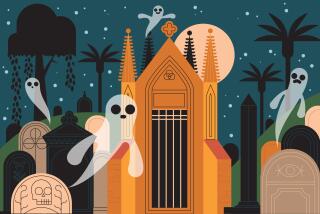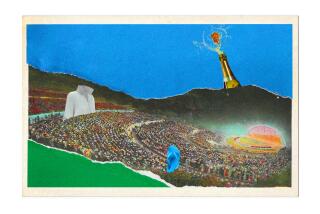From the Archives: The Audience: Saturday Night Fervor at Tiffany
The L.A. Times went head-first into the cult of crazy that inhabited midnight screenings of “The Rocky Horror Picture Show.” Take a trip back to the Tiffany Theater in 1978 to a world of rice-throwers and toast makers -- a celebration of the notion that it’s OK to be weird. This story originally appeared in print on July 19, 1978.
IT’S WHAT YOU MIGHT CALL A NORMAL Saturday night on Sunset Blvd. An hour before the midnight show starts, about 30 people are standing in line in front of the Tiffany Theater to “The Rocky Horror Picture Show.” A few of them look like they’ve just come from a Halloween party, but that’s not particularly unusual in this part of town.
What is unusual is that some of these people have seen this movie more than 100 times. For reasons nobody knows, “The Rocky Horror Picture Show” has become the biggest cult movie in history. They’ve been running midnight shows to packed houses at the Tiffany every Friday and Saturday night for a year and a a half and the thing just keeps getting more popular.
The movie is a musical parody of the classic horror film, in which Frankenstein and Dracula are replaced by bisexuals from another planet. But the regulars don’t come just to watch. They’re here to participate. Some are dressed like characters in the film. They know the songs and the dialog by heart and actually perform a couple of production numbers inside the theater before the movie starts and just as it ends. They also shout out their own lines as the plot unfolds, and provide special effects. During an early wedding scene, for example, they throw rice all over the theater.
Right now, however, it’s still a long wait for the show time. Outside, the first four people in line, all wearing costumes they made, are entertaining the others with a zippy little tune with the catchy refrain. “I’m just a sweet little transvestite from Transylvania.” One is dressed as a ghoulish servant, Riff Raff, another as a lascivious maid, Magenta, a third as a groupie named Columbia. The fourth, wearing a black Dracula cape with matching lingerie underneath, is dressed as the movie’s main character, Dr. Frank N. Furter, a transvestite from the planet Transsexual.
Dr. Frank N. Furter, played in the movie by Tim Curry, turns out in this case to be a woman who givers her name as D. Garrett Gafford. She’s 28, she says. Lives in Hollywood. Isn’t working at the moment, but would love to scrap together $10,000 so she could have a sex change operation and became a man, she says. Many of the others in line look like kids from the suburbs in for a Saturday night walk on the wild side. You can’t stereotype all the “Rocky Horror” cultists, Ms. Gafford says. It takes all kinds.
“About a third in the audience know the movie cold,” says Elaine O’Rourke, a 17-year-old from Chino wearing something that looks like a black satin swimsuit over fishnet stockings and blue anklettes and identifying herself as the character Columbia. “Go in with your mind open. The only message is give yourself to absolute pleasure. It’s kind of a chance to get away from the hum-drum.”
That doesn’t quite explain the phenomenon, but it’s as close as anybody gets. “Rocky Horror” opened first as a play in London, them came out as a movie in 1975. From the beginning, there were people who kept going back to see it week after week. But they didn’t start “living” the film until the past couple of years, when it hit the midnight movie circuit in New York, Los Angeles and other cities.
“Cult films have been around a long time, but there’s never been anything like this before,” says Marc Mancini, an associate professor of film at West Los Angeles College who also teaches at USC. “What fascinates me is that it’s the first real example I have seen of participatory film, where the barrier between the audience and screen is totally broken.”
“For hundreds of years the theater has attempted to break down the barrier between the audience and the stage. When you come down to it, Shakespeare’s soliloquies were exactly that. But that’s sort of easy to do physically on the stage. A movie theater is an entirely difference space. A character on the screen cannot walk into an audience.”
There wasn’t any deliberate effort to structure the movie to produce the cultthat’s grown around it. So how did it happen? The bizarre sexual theme is part of the answer, Mancini suspects. But there have been plenty of more bizarre movies made over the years. There really isn’t any answer, he says.
“I don’t know that there’s any particular message, except maybe that it’s OK to be weird,” he says. “There’s an appeal to gays, bisexuals, anyone who feels outside the sexual norm of society. But it also appeals to a lot of people who just like playing the game, people who go to gay discos even though they aren’t gay. You’ve got the whole Hollywood kinky crowd. Beverly Hills kids showing weird they are, others who want to see what’s going on.”
Most of them, in fact, look downright ordinary. The Tiffany holds 338 people, and most are in line now waiting for the doors to open. Those in costumes at the front are still singing. The others are just chatting, while street peddlers work their way down the line selling Rocky Horror T-shirts and photographs of the cast for $5.
They all have different reasons for returning week after week. Erick Passmore, an 18-year-old premed student at UCLA, says he’s seen it every other week for the past several months. Why? “I like the show,” he says. Valerie Spencer, 17, a senior at Taft High School, says she’s seen the movie 14 times. “It’s so energetic, so intense,” she explains.
The doors are finally opening. There’s a rush by the regulars to get the front rows. After all, they are part of the show themselves and they need to be where the rest of the audience can see them. Riff Raff, Magenta, Columbia and Dr. Frank N Furter have the center seats, befitting their special status. Down the row a few seats, Pat Brown, a 19-year-old from Van Nuys, turns to inform a newcomer that this will be the 127th time he’s seen the movie.
“To me it releases all my tensions,” he says.
There isn’t time for further conversation. Although the movie hasn’t started yet, the sound track is up, blaring out a song called “Time Warp.” It’s one of the big numbers from the movie and about 30 members of the audience are on their feet singing and dancing in front of the screen.
Brown jumps up to join the others, the whole line dancing and wiggling in the front of the theater like some kind of freaked out Gong Show chorus line. When they finish, the others applaud and they return to their seats as the movie starts.
There’s a ritualistic quality to much of what follows. The movie itself takes off on the Frankenstein theme. Two young innocents, engaged to be married, are driving through a rain-storm when they get a flat tire. They spot an old Gothic castle and seek shelter there, not knowing that the residents are a rather decadent lot whose leader, Dr. Frank N. Furter, is about to unveil his latest creation, a muscle-bound named Rocky Horror.
The newcomers, Brad and Janet, are horrified at first by the bizarre band of aliens from another galaxy. But by the movie’s end they have experienced a number of close encounters with Dr. Frank N. Furter and others that’s made them feel more at home. Throughout, the audience accompanies the action with appropriate phrases, boos, cheers, hisses and, at the end, another dance number.
That’s all, folks. Show’s over, and it will be another week before D. Garrett Gafford and her friends don their costumes to return again as real-life movie characters. As the audience leaves another one files in. “The Rocky Horror Picture Show” plays regularly at a couple of theaters in the Los Angeles area. But the Tiffany is where the real action is, and the crowds have grown so big that they’ve added a 2 a.m. show during the summer months.
Outside, Al Hemstead, a 31 year-old accountant from Sunland, and his wife, Barbara, a secretary, agree that the movie was “very different.” This was the first time for them. They came tonight with another couple from Van Nuys, and they want to be diplomatic about the whole thing.
“I know I won’t be coming back every week,” says Hemstead. “But it’s possible we might bring somebody else to see it sometime. I suppose it’s the kind of thing that’s worth seeing. But I’m not going to go home and start making a costume.”
Let’s do the “Time Warp” again:
Tim Curry behind-the-scenes at the LA stage show of “Rocky Horror”
Barry Bostwick on Brad, and the song you never got to hear
“De-virginizing” first-timers at Balboa Cinema’s weekly “Rocky Horror Picture Show”
More to Read
The biggest entertainment stories
Get our big stories about Hollywood, film, television, music, arts, culture and more right in your inbox as soon as they publish.
You may occasionally receive promotional content from the Los Angeles Times.










